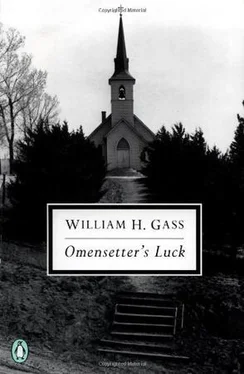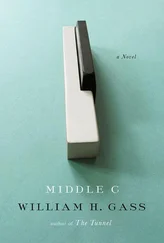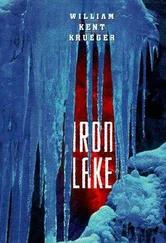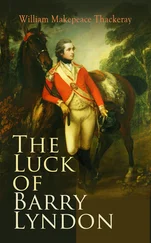Luther roared and struck the wall with his fist.
I'd never have trusted that Indian on my place, he finally managed. You could tell he'd have a dirty-feathered shaft.
Well, like they say these days, Luther, the only good Indian's a lead one.
Hawkins roared again and rolled off down the hall. Furber stepped back to let him pass.
Hawkins, come in here, Stitt yelled.
I've lost my glasses.
They're in my case, I think, remember, Olus?
Orcutt stood in front of the fire for a moment, enduring a spasm of shivering.
How is Emma, really, Doc?
She's old, is all, Curt, merely old.
Orcutt kicked off his boots. Then he tugged at his beard, leaning into the fire, combing the beard with his fingers.
Let me toss on another.
The wood fell in the fire with a crash and a shower of sparks flew up the chimney.
Orcutt bent over the cradle, silent a good while. How long, he said quietly. No one answered. How long has this been going on? Dammit.
He knuckled his eyes.
Where are the parents?
He straightened quickly.
Bring me my case, please, Olus, thank you. Diphtheria all right. As early as I've seen it in an infant. And bad, Olus — you were right. Where are the parents?
She fainted and Furber put her somewhere. Omensetter's outside somewhere — gone.
Orcutt hesitated.
What are you saying, Curtis? Somewhere? put her somewhere?
Chamlay shrugged.
In the other bedroom, I suppose.
Orcutt blinked.
Furber's here then. Well.
He bent over the cradle again.
Damn these eyes. The wind like to blown them out. Gone, you say? out, hey? somewhere. So Furber's here though. He'll be needed, like as not. Where'd Omensetter get to?
I don't know. Furber thought he might have gone for you.
Orcutt paused a moment in his manipulations, then went on. The baby squeaked.
A simple infant, he said. Utterly neglected. It's criminal.
And all this thumping about in here… you lummoxes…
He shook his head and slumped with weariness.
Bad, Truxton?
Like I said, Olus.
Any chance at all?
Not really.
Diphtheria… it's a terrible thing. Orcutt sighed.
Men, in my experience, are the worst disease,
he said. Then he slowly bent again to his inspection.
Orcutt was not disposed to be pleasant. He ignored the question. He sipped his coffee.
We've business here ourselves, Truxton.
The self-appointed.
Someone has to. It's no pleasure.
Ain't it? Well, you'll not mind if I've no patience for it — fresh out of that. But I can figure what you're up to, you been hitching to it -all along. It ain't completely usual in you, Curtis… I'll say it ain't good either. That sort of thing can wait, don't pile it up on top of all of this. You must be numb inside and that's a fact.
None of us is numb, we've got our feelings — the whole town has its feelings — and I'm surprised at what you say. My feelings — everybody's — they're just the same — you know that. Why, we harbored him. From the time he dragged his horse and bragging wagon into town, he made himself at home here. We took him in. Sure — Henry and Watson mainly — but everybody some. You've got no memory for it? the little time it took and what he's done? So you might say my feelings — all ours here — are just for everybody.
You're doing everybody's feeling for them, hey? Medically, that ain't easy.
Dammit, Truxton, you know what I mean. The problem's plain enough, and so's our duty. You should have heard the way that bastard talked when we came out here.
Duty, hey? Delightful word. The mons veneris of morality. So considerately short a noise too, duty is.
Orcutt blew on his coffee.
What a curious thing you are, though, Curtis, to speak of duty here so early on such a snowy morning when everyone is thick-eyed from sitting by the fire all night and tipped down in the mind.
Or is that your notion? What's eating on you?
Curtis — know what a doctor's duty is? He swears to it, you know. He takes a sacred Grecian oath. To do his duty.
Orcutt wiped his mouth.
Well it's two thousand years old — the oath is — but that don't help it any. What can a doctor really do, Curtis-ever think about it? I've been at it a long time now, and I know what I can do. Nothing. I sit around and drink coffee. Pass the time of day. It's a damn silly oath, really — pretentious and silly.
Oh well, Truxton—
Sawed both legs off a boy once that was smashed by a wagon. His mother says to me before I leave— I got his legs in a burlap bag his father kindly lent to me — you must be tired, do have tea. Red hair she had like a forest burning, and deep green eyes. So I did. I had tea. It was good tea, Curtis, most excellent of the green kind, carefully cooked, one of the best cups I ever drank — like this coffee now that Luther has so nicely boiled for me.
Look, really Truxton — jesus—
Only thing bothered was the blasted bag. He give it to me and he says: get them off the place, get them away. I drank my tea with the sack resting on my feet. I don't know what she thought it was, maybe she knew. I just prayed it wouldn't leak onto her rug. It didn't though — a little blood on my socks was all.
For god's sake, Truxton, we've been through enough.
I remember another time when I was holding the hand of a fellow in a coma — nothing to do but sit and look wise while the organs of his body ate on one another — a long night, it was, too, before he died — well, his son was sitting in a chair over by the door — he was maybe fifteen, maybe more — and he and I were the only ones in the room with his pa and his pa's snore — and the whole time, the whole time, mind, the whole time this boy sit there by the door looking down, hunting a picture of his hate in the floor, I don't know, but looking down and muttering over and over just loud enough for me to get it: I hope you die you bastard, die; I hope you die; die die die. Finally, you know, I just up and screams at him — thump thump thump, he'd been going, die die die — I yell to shut up, but he wasn't a person, he was a drip from a pump — thunk thunk thunk — die — that's all — and I had to get up and tilt back that chair and haul his ass out of that room like he was heaped up in a barrow… singing his little tune.
God. Tell them about the cut-rate tonsil—
The old man died of course, like he'd been told to, and then that crazy fool kid went in the barn and fired a shotgun at his head.
Doc? Hey, it's hurting again.
Let me tell you something funny about poor Boylee — we've lots of time.
Time… yeah. We've plenty of time.
Christ, yes, time, we've sure got that. We've got no damn horses but we've got time.
Doc — tell them about the—
Well several years back when the tail of the Hen Woods burned — remember? — Boylee was out there fighting the fire and one of the Duluth children — they've moved since, remember them? — climbed up a tree to watch the blaze — and it was something to see, too — so anyway, while he was watching he caught his foot in a crotch and got it stuck there. Well, as you can bet, he was howling something fearful as the fire burned down to him. Boylee was there too, running wild around the bottom of the tree and yelling like a fool when I rode up with Watson. Mat climbed up there easy and took him down. It wasn't hard, but Boylee — well, I just figure Boylee was afraid a little. Surprising, ain't it? Real scared, he must have been. It's interesting… Of course it wasn't snowing then, the twigs weren't frozen into nails and the bark icy, and of course it was broad day and the boy was a mere fifteen feet up, maybe, if that, and the climb — well — the kid had got there. Funny, ain't it, how things happen. Boylee's been mad at me ever since, just because I was there to see him do his dance, and maybe because I laughed so hard. Course the child was alive too, not shit on and bit up and hung out like Henry Pimber.
Читать дальше












![William Frith - John Leech, His Life and Work, Vol. 2 [of 2]](/books/748201/william-frith-john-leech-his-life-and-work-vol-thumb.webp)